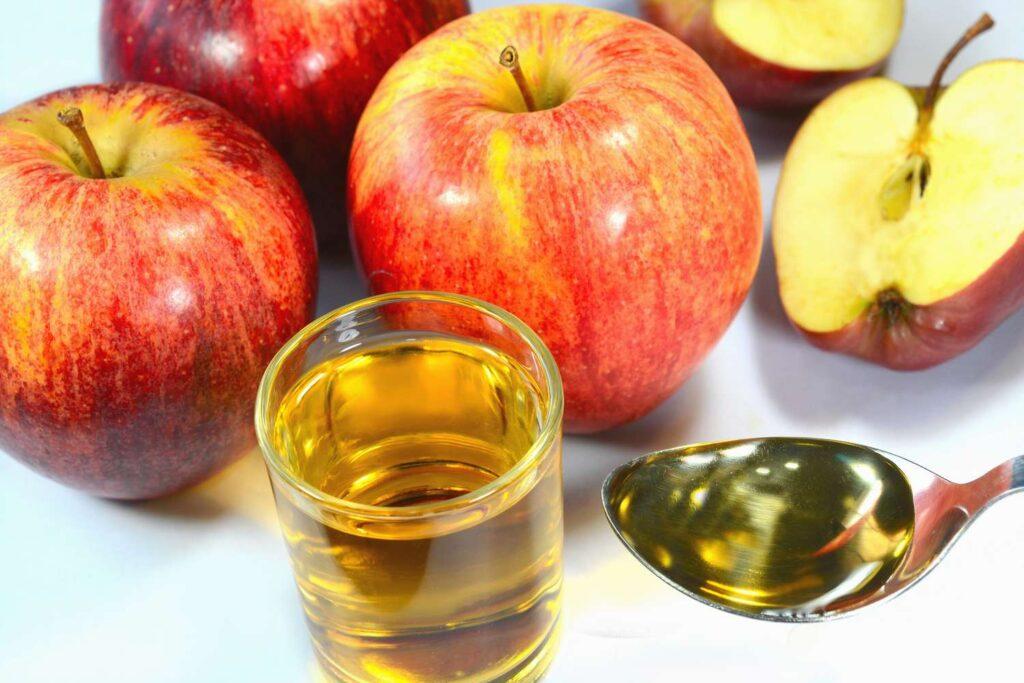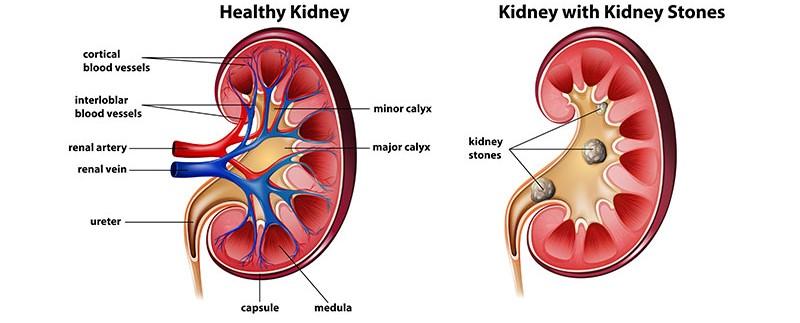
Apple Cider Vinegar for Kidney Stones: An Effective Natural Remedy
Kidney stones are a common urinary tract problem that can cause immense pain and discomfort. While medical treatments are available, many people are turning to natural remedies like apple cider vinegar (ACV) to alleviate symptoms and potentially dissolve kidney stones.
If you are looking for what dissolves kidney stones fast, then you should read this article carefully. We will explore the potential benefits of using apple cider vinegar for kidney stones, its effectiveness, and how to incorporate it into your daily routine.
Understanding Kidney Stones
Kidney stones are hard mineral and salt deposits that form in the kidneys. They can vary in size and shape and can cause excruciating pain when they pass through the urinary tract. Several factors contribute to their formation, including dehydration, improper diet, and certain medical conditions. Traditional treatments for kidney stones involve medication, surgery, or medical procedures like lithotripsy.
Symptoms of Kidney Stones
- Intense pain in the back or side.
- Pain that radiates to the lower abdomen and groin.
- Discomfort while urinating.
- Pink, red, or brown urine.
- Cloudy or foul-smelling urine.
- Frequent urge to urinate.
- Painful urination.
- Nausea and vomiting.
- Persistent need to urinate but passing only small amounts.
- Fever and chills (if infection is present).
How to dissolve kidney stones in 24 hours?
While there is no scientifically proven method to dissolve kidney stones within 24 hours, staying well-hydrated is crucial for faster passage. While substances like apple cider vinegar and lemon juice are suggested to aid in dissolving stones, their effectiveness lacks comprehensive research. Adequate fluid intake remains key for passing existing stones and preventing new formations.
Apple Cider Vinegar: Composition and Benefits

Apple cider vinegar is a fermented liquid made from crushed apples. It contains acetic acid, citric acid, and various minerals like potassium, which may contribute to its potential health benefits. ACV has gained popularity for its numerous health claims, including weight loss, digestion improvement, and even managing blood sugar levels.
Is Apple Cider Vinegar Good For Kidney Stones?
Although scientific research on the direct effects of apple cider vinegar for kidney stones
is limited, some evidence suggests its potential benefits. ACV is thought to aid in the dissolution and prevention of kidney stones due to its acidity and citric acid content.
The acetic acid in ACV may help break down and dissolve certain types of kidney stones, making them easier to pass naturally. Additionally, the citric acid content in ACV may inhibit stone formation by preventing the crystallization of minerals within the kidneys.
Incorporating Apple Cider Vinegar into Your Routine

Before incorporating apple cider vinegar for kidney stones treatment regimen, it is essential to consult with a healthcare professional. They can assess your condition, provide guidance, and ensure it does not interfere with any existing treatments or medications. If approved, here are some ways to use ACV:
Diluted ACV Drink: Mix 1-2 tablespoons of raw, unfiltered apple cider vinegar with a glass of water. Drink this mixture 2-3 times a day, preferably before meals. Start with a smaller amount and gradually increase the dosage to avoid any adverse effects.
ACV Salad Dressing: Incorporate apple cider vinegar into your salads by using it as a dressing. Combine ACV with olive oil, lemon juice, and herbs for added flavor and health benefits.
ACV Bath Soak: Add a cup of apple cider vinegar to your warm bathwater and soak for 20-30 minutes. This may help relieve kidney stone-related pain and promote relaxation.
How Much Apple Cider Vinegar To Drink For Kidney Stones?
To potentially help prevent kidney stones, you can dilute 1-2 tablespoons of raw, unfiltered apple cider vinegar (ACV) in a large glass of water. Begin with once a day, preferably in the morning, and gradually increase frequency if tolerated.
However, consult a healthcare professional before making dietary changes. ACV’s acidic nature may help dissolve minerals contributing to stone formation, but it’s essential to maintain proper hydration and follow your doctor’s advice.
How To Drink Apple Cider Vinegar For Kidney Stones?
While it’s important to consult a healthcare professional before making any significant changes to your diet, here are some guidelines on how to take apple cider vinegar for kidney stones.
To use apple cider vinegar for kidney stones, consider the following steps:
- Dilution: ACV is highly acidic and can be harsh on your teeth and digestive system. Mix 1-2 tablespoons of raw, unfiltered ACV in a large glass of water. This dilution helps reduce its acidity while still providing potential benefits.
- Frequency: Start with once a day, preferably in the morning. You can gradually increase the frequency if your body tolerates it well. Some people choose to drink it 2-3 times a day.
- Consumption: Drink the ACV-water mixture through a straw to minimize contact with your teeth. After consuming, rinse your mouth with plain water.
- Hydration: Continue drinking plenty of water throughout the day to stay well-hydrated. Adequate water intake helps flush out toxins and minerals that contribute to stone formation.
- Consistency: Consistency is key. While ACV may offer potential benefits, it’s not an overnight solution. Regular use over a longer period may yield better results.
- Monitoring: Keep an eye on any changes in your symptoms and overall health. If you experience any adverse effects, such as stomach discomfort, stop using ACV and consult a healthcare professional.
Along with knowing how to use apple cider vinegar for kidney stones it is vital to remember that ACV’s effectiveness for kidney stones varies from person to person. While some individuals may find relief, others may not experience significant benefits. It’s crucial to combine ACV use with a balanced diet rich in fruits, vegetables, and whole grains, and to follow your doctor’s recommendations for managing kidney stones.
Does apple cider vinegar help break down kidney stones?
While there is some anecdotal evidence to suggest that the acidic properties of apple cider vinegar (ACV) may help dissolve certain types of kidney stones, scientific research is limited and inconclusive. ACV’s acidity might potentially aid in breaking down minerals that contribute to stone formation. However, its effectiveness varies among individuals and stone types.
Consulting a healthcare professional before using apple cider vinegar for kidney stones is crucial. It’s essential to consider medical advice, balanced hydration, and a comprehensive approach to managing kidney stone concerns.
Apple Cider Vinegar Side Effects On Kidneys

While apple cider vinegar is generally safe for most people, it is important to be mindful of a few precautions. Undiluted apple cider vinegar for kidney stones can erode tooth enamel and irritate the throat and stomach lining. It is crucial to dilute it before consumption and rinse your mouth afterward. Excessive consumption of ACV may also lower potassium levels, so it is advisable to monitor your potassium intake if you plan to use ACV regularly.
Conclusion
Apple cider vinegar for kidney stones shows promise as a natural remedy, thanks to its potential to dissolve and prevent stone formation. However, it is crucial to remember that individual experiences may vary, and it should not replace medical advice or treatments.
If you are considering apple cider vinegar for kidney stones treatment, consult with a healthcare professional to ensure it aligns with your specific needs. With their guidance, you can explore the potential benefits of this natural remedy while prioritizing your overall kidney health.
Frequently Asked Questions Related to Apple Cider Vinegar for Kidney Stones
1. Is apple cider vinegar effective for treating kidney stones?
While apple cider vinegar (ACV) has been used as a natural remedy for various health conditions, its effectiveness in treating kidney stones is not yet fully supported by scientific research. Some anecdotal evidence suggests that ACV may aid in dissolving certain types of kidney stones due to its acidic nature and citric acid content.
2. How does apple cider vinegar potentially help with kidney stones?
The acetic acid in apple cider vinegar is thought to assist in breaking down and dissolving certain types of kidney stones, making them easier to pass naturally. Additionally, the citric acid present in ACV may inhibit the formation of new stones by preventing the crystallization of minerals within the kidneys.
3. Can anyone use apple cider vinegar for kidney stones?
While many people may find apple cider vinegar beneficial, it is essential to consult with a healthcare professional before using it as a treatment for kidney stones. Your healthcare provider can assess your individual circumstances and advise you on the appropriate course of action.
4. How should I consume apple cider vinegar for kidney stones?
If approved by your healthcare professional, you can consume diluted apple cider vinegar by mixing 1-2 tablespoons of raw, unfiltered ACV with a glass of water. It is recommended to drink this mixture 2-3 times a day, preferably before meals. However, it is crucial to start with smaller amounts and gradually increase the dosage to minimize the risk of any adverse effects.
5. Are there any potential side effects of using apple cider vinegar for kidney stones?
While apple cider vinegar is generally safe for most people, it is important to use it responsibly. Undiluted ACV can erode tooth enamel and irritate the throat and stomach lining. To mitigate these risks, always dilute ACV before consumption and rinse your mouth afterward. Excessive consumption of ACV may also lower potassium levels, so it is advisable to monitor your potassium intake if you plan to use ACV regularly.
6. Can apple cider vinegar alone treat large kidney stones?
Large kidney stones typically require medical intervention such as surgery, lithotripsy, or other medical procedures. Apple cider vinegar, on its own, may not be sufficient to treat large kidney stones. It is important to consult with a healthcare professional to determine the most appropriate treatment plan based on the size and composition of your kidney stones.
7. Can apple cider vinegar prevent kidney stones from forming?
The citric acid content in apple cider vinegar may help inhibit the formation of new kidney stones by preventing the crystallization of minerals. However, prevention strategies for kidney stones are multifaceted and may involve dietary changes, increased fluid intake, and other lifestyle modifications. Consult with a healthcare professional to develop a comprehensive plan for kidney stone prevention.
8. Are there any alternatives to apple cider vinegar for kidney stones?
If apple cider vinegar is not suitable for you or if you are looking for alternative natural remedies, there are other options to explore. Lemon juice, for example, is also known for its citric acid content and potential benefits in preventing kidney stone formation. However, it is crucial to consult with a healthcare professional to determine the most suitable alternative based on your individual circumstances.

